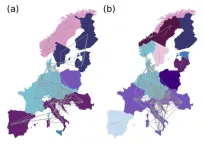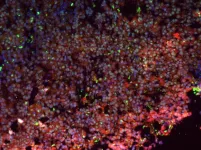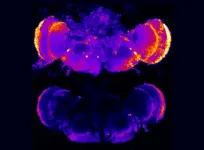(Press-News.org) Scientists have identified a gene which, when missing or impaired, can cause obesity, behavioural problems and, in mothers, postnatal depression. The discovery, reported today in Cell, may have wider implications for the treatment of postnatal depression, with a study in mice suggesting that oxytocin may alleviate symptoms.
Obesity and postnatal depression are significant global health problems. Postnatal depression affects more than one in 10 women within a year of giving birth and is linked to an increased risk of suicide, which accounts for as many as one in five maternal deaths in high income countries. Meanwhile, obesity has more than doubled in adults since 1990 and quadrupled in adolescents, according to the World Health Organization.
While investigating two boys from different families with severe obesity, anxiety, autism, and behavioural problems triggered by sounds or smells, a team led by scientists at the University of Cambridge, UK, and Baylor College of Medicine, Houston, USA, discovered that the boys were missing a single gene, known as TRPC5, which sits on the X chromosome.
Further investigation revealed that both boys inherited the gene deletion from their mothers, who were missing the gene on one of their X chromosomes. The mothers also had obesity, but in addition had experienced postnatal depression.
To test if it was the TRPC5 gene that was causing the problems in the boys and their mothers, the researchers turned to animal models, genetically-engineering mice with a defective version of the gene (Trpc5 in mice).
Male mice with this defective gene displayed the same problems as the boys, including weight gain, anxiety, a dislike of social interactions, and aggressive behaviour. Female mice displayed the same behaviours, but when they became mothers, they also displayed depressive behaviour and impaired maternal care. Interestingly, male mice and female mice who were not mothers but carried the mutation did not show depression-like behaviour.
Dr Yong Xu, Associate Director for Basic Sciences at the USDA/ARS Children’s Nutrition Research Center at Baylor College of Medicine, said: “What we saw in those mice was quite remarkable. They displayed very similar behaviours to those seen in people missing the TRPC5 gene, which in mothers included signs of depression and a difficulty caring for their babies. This shows us that this gene is causing these behaviours.”
TRPC5 is one of a family of genes that are involved in detecting sensory signals, such as heat, taste and touch. This particular gene acts on a pathway in the hypothalamus region of the brain, where it is known to control appetite.
When the researchers looked in more detail at this brain region, they discovered that TRPC5 acts on oxytocin neurons – nerve cells that produce the hormone oxytocin, often nicknamed the ‘love hormone’ because of its release in response to displays of affection, emotion and bonding.
Deleting the gene from these oxytocin neurons led to otherwise healthy mice showing similar signs of anxiety, overeating and impaired sociability, and, in the case of mothers, postnatal depression. Restoring the gene in these neurons reduced body weight and symptoms of anxiety and postnatal depression.
In addition to acting on oxytocin neurons, the team showed that TRPC5 also acts on so-called POMC neurons, which have been known for some time to play an important role in regulating weight. Children in whom the POMC gene is not working properly often have an insatiable appetite and gain weight from an early age.
Professor Sadaf Farooqi from the Institute of Metabolic Science at the University of Cambridge said: “There's a reason why people lacking TRPC5 develop all of these conditions. We’ve known for a long time that the hypothalamus plays a key role in regulating ‘instinctive behaviours’ – which enable humans and animals to survive – such as looking for food, social interaction, the flight or fight response, and caring for their infants. Our work shows that TRPC5 acts on oxytocin neurons in the hypothalamus to play a critical role in regulating our instincts.”
While deletions of the TRPC5 gene are rare, an analysis of DNA samples from around 500,000 individuals in UK Biobank revealed 369 people – around three-quarters of whom were women – that carried variants of the gene and had a higher-than-average body mass index.
The researchers say their findings suggests that restoring oxytocin could help treat people with missing or defective TRPC5 genes, and potentially mothers experiencing postnatal depression.
Professor Farooqi said: “While some genetic conditions such as TRPC5 deficiency are very rare, they teach us important lessons about how the body works. In this instance, we have made a breakthrough in understanding postnatal depression, a serious health problem about which very little is known despite many decades of research. And importantly, it may point to oxytocin as a possible treatment for some mothers with this condition.”
There is already evidence in animals that the oxytocin system is involved in both depression and in maternal care and there have been small trials into the use of oxytocin as a treatment. The team say their work provides direct proof of oxytocin’s role, which will be crucial in supporting bigger, multi-centre trials.
Professor Farooqi added: “This research reminds us that many behaviours which we assume are entirely under our control have a strong basis in biology, whether that’s our eating behaviour, anxiety or postnatal depression. We need to be more understanding and sympathetic towards people who suffer with these conditions.”
This work was supported by Wellcome, the National Institute for Health and Care Research (NIHR), NIHR Cambridge Biomedical Research Centre, Botnar Fondation and Bernard Wolfe Health Neuroscience Endowment.
Reference
Li, Y, Cacciottolo, TM & Yin, N. Loss of Transient Receptor Potential Channel 5 Causes Obesity and Postpartum Depression. Cell; 2 July 2024; DOI: 10.1016/j.cell.2024.06.001
END
Genetic study points to oxytocin as possible treatment for obesity and postnatal depression
2024-07-02
ELSE PRESS RELEASES FROM THIS DATE:
What was behind the 2021-2022 energy crisis within Europe?
2024-07-02
WASHINGTON, July 2, 2024 – An energy crisis hit Europe in 2021-2022, following Russia’s invasion of Ukraine, which sent electricity prices skyrocketing — even within countries that don’t rely on Russian gas. It begs the question: Was there more to it?
A team of researchers from the Institute for Energy and Climate Research at Forschungszentrum Jülich, the University of Cologne, and the Norwegian University of Life Sciences had already been working with electricity price data for years, exploring statistics and developing forecasting methods. Adopting a European perspective, ...
Alterations in human gene TRPC5 cause obesity and postpartum depression
2024-07-02
Researchers at Baylor College of Medicine, the University of Cambridge and collaborating institutions have discovered that alterations in the human gene TRPC5 cause obesity and postpartum depression.
Taken together, their studies in cells, animal models and humans showed that TRPC5 acts on distinct neuronal populations in the hypothalamus, a brain region that regulates multiple innate behaviors including feeding, anxiety, socialization and maternal care. The findings, published in the journal Cell, ...
In-hospital delirium and disability and cognitive impairment after COVID-19 hospitalization
2024-07-02
About The Study: In this cohort study of 311 hospitalized older adults with COVID-19, in-hospital delirium was associated with increased functional disability and cognitive impairment over the 6 months following discharge. Older survivors of a COVID-19 hospitalization who experience in-hospital delirium should be assessed for disability and cognitive impairment during postdischarge follow-up.
Corresponding author: To contact the corresponding author, Lauren E. Ferrante, M.D., M.H.S., email lauren.ferrante@yale.edu.
To access the embargoed study: Visit our For The Media website at this link https://media.jamanetwork.com/
(doi: 10.1001/jamanetworkopen.2024.19640)
Editor’s ...
E-cigarette use and lung cancer screening uptake
2024-07-02
About The Study: In this cross-sectional study, e-cigarette use was independently associated with lower use of lung cancer screening, particularly among individuals who had quit smoking combustible cigarettes. Emerging research suggests that e-cigarettes contain definite and probable carcinogens and cause similar cancer-associated gene deregulations as combustible tobacco.
Corresponding author: To contact the corresponding author, Qian Wang, M.D., M.P.H., email qian.wang@uhhospitals.org.
To access the embargoed study: Visit our For The Media website at this link https://media.jamanetwork.com/
(doi: ...
A study led by UPF describes how insulinomas, a rare type of pancreatic beta cell tumor, form
2024-07-02
An experimental study led by Pompeu Fabra University describes the mechanism whereby insulinomas, a rare type of neuroendocrine tumour that affects pancreatic beta cells. According to the study, insulinomas are the result of the accumulation of rare mutations that lead to a homogeneous change in the epigenetic profile of pancreatic beta cells. This profile change causes beta cells to express unusually high levels of oncogenes, growth and transcription factors, and genes related to insulin production.
Insulinomas are rare pancreatic neuroendocrine tumours that involve the excessive growth of beta cells, which are responsible for secreting insulin. Often, they are diagnosed ...
NIH researchers discover a new face-detecting brain circuit
2024-07-02
Scientists at the National Institutes of Health (NIH) have uncovered a brain circuit in primates that rapidly detects faces. The findings help not only explain how primates sense and recognize faces, but could also have implications for understanding conditions such as autism, where face detection and recognition are often impaired from early childhood. The newly discovered circuit first engages an evolutionarily ancient part of the brain called the superior colliculus, which can then trigger the eyes and head to turn for a better look. This better view enables different brain areas in the temporal cortex to engage ...
Potential new target for early treatment of Alzheimer's disease
2024-07-02
UNIVERSITY PARK, Pa. — A class of proteins that regulates cell repair and enhances cell growth-signaling systems could be a promising new target for the treatment of Alzheimer's and other neurodegenerative diseases, according to a new study led by researchers at Penn State. They found that disrupting necessary sugar modifications of these proteins promotes cell repair and reverses cellular abnormalities that occur in neurodegenerative diseases.
The study appeared today (July 2) in the journal iScience, and the researchers have a patent related to this work.
“Strategies ...
Subnormal serum liver enzyme levels
2024-07-02
Liver diseases are commonly diagnosed using serum enzyme assays, particularly for aspartate aminotransferase (AST), alanine aminotransferase (ALT), alkaline phosphatase (ALP), gamma-glutamyl transpeptidase (GGT), and 5'-nucleotidase (5'-NT). While elevated levels of these enzymes are typically associated with liver and bile duct injuries, subnormal levels can also indicate various pathologies. This review consolidates current knowledge on diseases linked with subnormal liver enzyme levels, focusing on their pathogenesis, specificity, and treatment ...
Too much treadmill? This could help your shin splints
2024-07-02
Good news for all the treadmill runners who suffer from stubborn and painful shin splints: A little outdoor gait training may help, new research suggests.
A randomized controlled trial found that four weeks of gait training outdoors, in addition to home exercises often prescribed for shin splints, led to improved running biomechanics even when the runners were using a treadmill. These improvements included decreasing the time the runners’ feet were in contact with the ground or treadmill, a recently identified contributor to shin splints.
Based on the trial results, ...
Journal of Participatory Medicine announces new theme issue on Patient and Consumer Use of Artificial Intelligence for Health
2024-07-02
(Toronto, July 2, 2024) JMIR Publications invites submissions to a new theme issue titled “Patient and Consumer Use of Artificial Intelligence for Health” in its premier open access journal Journal of Participatory Medicine indexed in PubMed, SCOPUS, Sherpa Romeo, and DOAJ.
This theme issue will explore the use of AI for health (AIH) from the perspectives of patients and the public. The journal is seeking papers that examine (a) the experience and impact of patients and health consumers using AI applications, and (b) the involvement of patients, caregivers, and the public in the co-design and development of AIH.
For this theme issue, the journal ...





